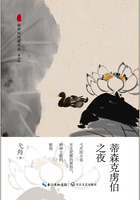"What is going on in her? What is she thinking? What does she feel? Does she mean to prove me, or can she really not forgive me? Is it that she cannot or that she will not express what she feels and thinks? Has she softened or hardened?" he asked himself, and could find no answer. He only knew that she had altered and that an important change was going on in her soul, and this change united him not only to her but also to Him for whose sake that change was being wrought. And this union brought on a state of joyful animation and tenderness.
When she returned to the ward, in which there stood eight small beds, Maslova began, in obedience to the nurse's order, to arrange one of the beds; and, bending over too far with the sheet, she slipped and nearly fell down.
A little convalescent boy with a bandaged neck, who was looking at her, laughed. Maslova could no longer contain herself and burst into loud laughter, and such contagious laughter that several of the children also burst out laughing, and one of the sisters rebuked her angrily.
"What are you giggling at? Do you think you are where you used to be? Go and fetch the food." Maslova obeyed and went where she was sent; but, catching the eye of the bandaged boy who was not allowed to laugh, she again burst out laughing.
Whenever she was alone Maslova again and again pulled the photograph partly out of the envelope and looked at it admiringly; but only in the evening when she was off duty and alone in the bedroom which she shared with a nurse, did she take it quite out of the envelope and gaze long at the faded yellow photograph, caressing with, her eyes every detail of faces and clothing, the steps of the veranda, and the bushes which served as a background to his and hers and his aunts' faces, and could not cease from admiring especially herself--her pretty young face with the curly hair round the forehead. She was so absorbed that she did not hear her fellow-nurse come into the room.
"What is it that he's given you?" said the good-natured, fat nurse, stooping over the photograph.
"Who's this? You?"
"Who else?" said Maslova, looking into her companion's face with a smile.
"And who's this?"
"Himself."
"And is this his mother?"
"No, his aunt. Would you not have known me?"
"Never. The whole face is altered. Why, it must be 10 years since then."
"Not years, but a lifetime," said Maslova. And suddenly her animation went, her face grew gloomy, and a deep line appeared between her brows.
"Why so? Your way of life must have been an easy one."
"Easy, indeed," Maslova reiterated, closing her eyes and shaking her head. "It is hell."
"Why, what makes it so?"
"What makes it so! From eight till four in the morning, and every night the same!"
"Then why don't they give it up?"
"They can't give it up if they want to. But what's the use of talking?" Maslova said, jumping up and throwing the photograph into the drawer of the table. And with difficulty repressing angry tears, she ran out into the passage and slammed the door.
While looking at the group she imagined herself such as she was there and dreamt of her happiness then and of the possibility of happiness with him now. But her companion's words reminded her of what she was now and what she had been, and brought back all the horrors of that life, which she had felt but dimly, and not allowed herself to realise.
It was only now that the memory of all those terrible nights came vividly back to her, especially one during the carnival when she was expecting a student who had promised to buy her out. She remembered how she--wearing her low necked silk dress stained with wine, a red bow in her untidy hair, wearied, weak, half tipsy, having seen her visitors off, sat down during an interval in the dancing by the piano beside the bony pianiste with the blotchy face, who played the accompaniments to the violin, and began complaining of her hard fate; and how this pianiste said that she, too, was feeling how heavy her position was and would like to change it; and how Clara suddenly came up to them; and how they all three decided to change their life. They thought that the night was over, and were about to go away, when suddenly the noise of tipsy voices was herd in the ante-room. The violinist played a tune and the pianiste began hammering the first figure of a quadrille on the piano, to the tune of a most merry Russian song. A small, perspiring man, smelling of spirits, with a white tie and swallow-tail coat, which he took off after the first figure, came up to her, hiccoughing, and caught her up, while another fat man, with a beard, and also wearing a dress-coat (they had come straight from a ball) caught Clara up, and for a long time they turned, danced, screamed, drank. . . .
And so it went on for another year, and another, and a third. How could she help changing? And he was the cause of it all. And, suddenly, all her former bitterness against him reawoke; she wished to scold, to reproach him. She regretted having neglected the opportunity of repeating to him once more that she knew him, and would not give in to him--would not let him make use of her spiritually as he had done physically.
And she longed for drink in order to stifle the feeling of pity to herself and the useless feeling of reproach to him. And she would have broken her word if she had been inside the prison.
Here she could not get any spirits except by applying to the medical assistant, and she was afraid of him because he made up to her, and intimate relations with men were disgusting to her now. After sitting a while on a form in the passage she returned to her little room, and without paying any heed to her companion's words, she wept for a long time over her wrecked life.















